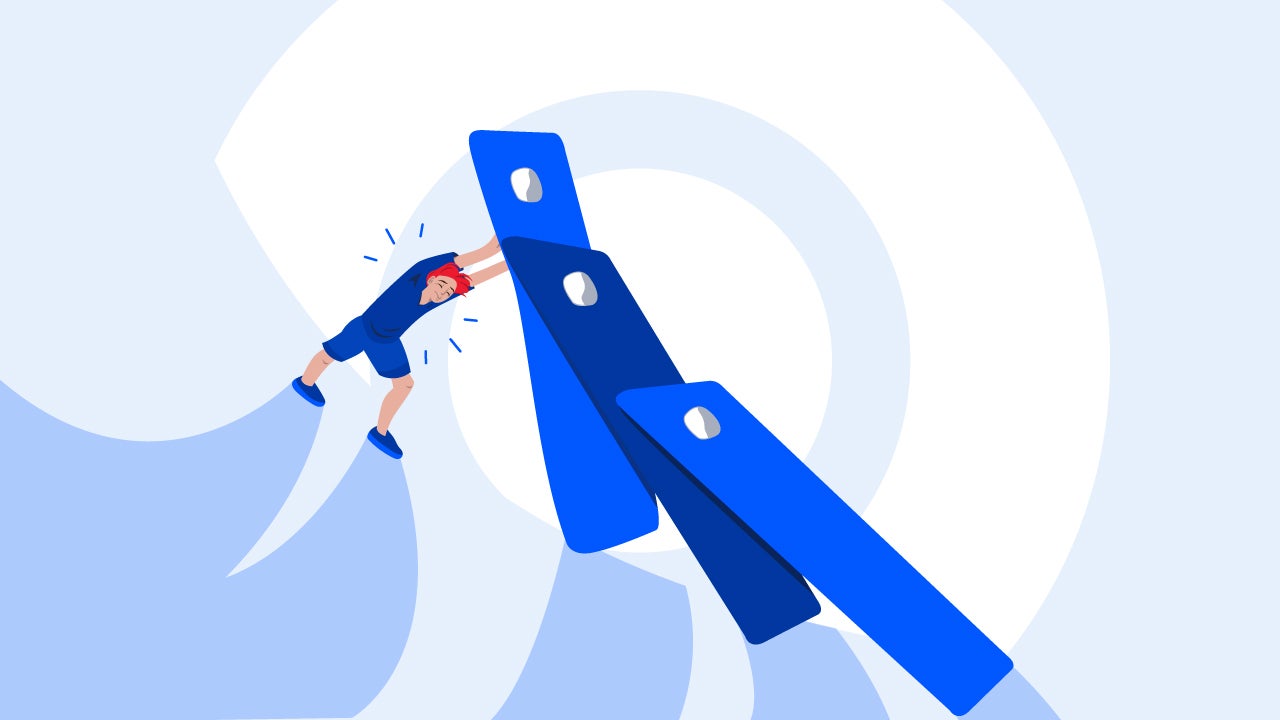Credit card default: How it happens, what to do about it

Key takeaways
- Credit card default can occur after six consecutive months of missed payments.
- Defaulting on a credit card can have significant consequences for your credit score and financial future.
- There are options for handling credit card default, such as negotiating with creditors and seeking help from a nonprofit credit counseling agency.
A 2024 Bankrate survey revealed that nearly half (48 percent) of credit card holders report having a balance on their card, and according to a recent H&R Block report, nearly 1 in 2 Americans hold credit card debt. And of those holding card debt, 2 in 3 say it’s unmanageable. If cards go unpaid and if enough time passes, you may enter into the land of credit card default.
Your credit card goes into default after you miss several monthly payments, which can hurt your credit score.
Even with a low-interest card, it can be easy to default as paying rent or mortgage, groceries and utility bills, and gas take precedent. But you should keep your credit report clean, since mortgage companies, landlords and prospective employers typically look up your credit report as part of the application process.
Discover how you can climb out of credit card default with these helpful tips.
What does default mean on a credit card?
Default on a credit card means you have not made the required minimum payments for an extended period of time, typically 180 days or more. At this point, the creditor might consider the account a loss and close your credit card account. A debt collection agency may then take over the defaulted account and, if not paid, can eventually pursue legal action to recover the debt.
How credit card default happens
Defaulting on a credit card does not happen right away. Before your account goes into default, it will become delinquent. This happens after missing a payment for typically 30 days. Default usually occurs after six months in a row of not making at least the minimum payment due. During that time, you will be contacted by your creditor, and they will discuss your options and your plans to repay your debt. However, if they are not satisfied with your response (or the lack thereof), the account will be closed and reported as charged off to the credit bureaus.
How credit card default affects your score
Once your account is delinquent, your credit score will be negatively impacted. When your account is charged off, the damage becomes more serious. Late payments are not immediately reported — for instance, if you miss your due date by a few days. Delinquency typically happens when you’re at least 30 days late. But once that happens, your score is in jeopardy of starting on a downward spiral.
Every month of nonpayment will result in another hit to your score, as the delinquency ages and balances owed increase due to interest and fees. And an actual default will likely result in the card’s line of credit being closed, which will cause your credit utilization ratio to soar to 100 percent on the account. It may be turned over to a collection agency, putting you in another category that will negatively impact your score.
What to do about credit card default
You should always try to make the minimum payment on your card to lower the balance on your card, but you have several options to handle your debt if it defaults.
-
You can continue to pay it off.
-
You can try to settle the debt for less than owed.
-
You can file for bankruptcy.
Whatever you decide, it’s best not to ignore the problem. Even if you are able to evade your creditors until the statute of limitations for debt is reached, you still owe the debt.
John Thompson, Vice-President of Spruce, agrees that it’s “important … not [to] ignore the situation” and recommends “pay[ing] attention to communication from creditors, including offers of support, assistance or guidance.”
Plus, depending on where you live, the statute of limitations could range from three to 20 years. That’s a long time to dodge a creditor. In the meantime, your credit score is likely to get worse.
Here are some options on how to manage and pay off credit card debt.
Pay in full
Paying your debt off in full is the best way to handle a default. While the creditor would love it if you could just write a check for the entire amount, having the cash to pay it in one fell swoop may be impossible. So, a payment plan may be the only option. Fortunately, many creditors are willing to work with customers to craft a short-term plan with reduced payments or lower interest charges. Contact your creditor to see if you can negotiate your card debt.
Contact your issuer
As with anything, prevention is better than a cure. If you find yourself in a position where you feel like you cannot make your payments, reach out to your credit card company immediately. Most creditors have systems in place to reduce your payments, at least for a short time, through a hardship program. These programs are not generally long-term, but may be enough to get you through to the other side.
“This is a positive place to start,” Thompson says. “Your creditor is generally interested in you repaying debt that they have issued, and all creditors have policies, processes, and programs to help engage with borrowers in difficult times.”
Debt settlement
You can also try to settle the debt by paying less than you owe, often with the aid of a debt consolidation company. Thompson explains, “If you are having difficulty across many credit cards and loans, consider debt consolidation products and companies that can aggregate your debts and create a single payment. That focus may help, and it may make monthly payments more manageable.”
But these negotiations are not without peril. Remember, if more than $600 in debt is forgiven, you will owe taxes on the forgiven debt. As with any negotiation, be sure to get everything in writing and make sure the language clearly states that the debt will be considered paid in full. Otherwise, you may find that the creditor or collector has sold the remaining portion of the debt to another collector, which may then come after you for the balance.
Also, be wary of debt settlement companies. While legitimate companies do exist, there are many far less reputable organizations that tend to be adversarial and have a poor track record. Thompson advises, “It is critical to investigate and understand the details of any consolidation or settlement programs, along with the companies that offer them. Be sure to understand the short and long-term impacts of any program and investigate the experiences of others with the organization where possible (through reviews and other social proof).”
You can look up a debt settlement company’s reputation on websites like Better Business Bureau or Trustpilot.
Bankruptcy
Bankruptcy may be a last resort if you run out of other options. As part of your decision-making process, you can call a nonprofit credit counseling agency. You will be required to have credit counseling as part of a bankruptcy filing, but if you call the agency first, they may be able to help you determine your best course of action and lessen any anxiety that might come with it.
Debt management plan
You may be able to combine features of all the above by using a debt management plan offered by a nonprofit credit counseling agency. If you qualify, they will get you preferred repayment terms, with concessions tailored to your budget for as long as five years. A debt management plan is similar to a Chapter 13 bankruptcy, but without the credit score damage. Contact the National Foundation for Credit Counseling to get in touch with a member you can trust to help you find the best solution.
The bottom line
Sometimes defaulting on your credit cards cannot be helped, but knowing the impact to your credit score can help you make the right decision. If you’re struggling to handle your credit card bills, communicating with your creditors early is your best hope of avoiding default.
Why we ask for feedback Your feedback helps us improve our content and services. It takes less than a minute to complete.
Your responses are anonymous and will only be used for improving our website.






